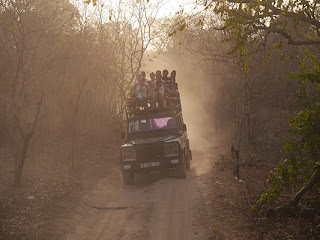We began our final
day at the Komfo Anokye Teaching Hospital in
Kumasi. As we walked
inside, we were greeted by children and adults of
all ages who had come
to see the talented Kumasi Cleft Palate Team for
pre and post-surgical
consultation. The faces of tiny babies as young as
two- months stared back at us from colorful cocoons on their mothers' backs as we smiled
and stroked their beautiful faces. Once in the clinic, we assessed the speech
and language of children with repaired and non-repaired cleft lips and/or
palates and provided recommendations. However, the highlight of the morning was
the time we spent demonstrating safe feeding techniques to mothers of babies
with non-repaired cleft palates.
While many of the
mothers had figured out how to best feed their babies with cleft palates, some
of the little ones were undernourished. An opening between the mouth and the
nose makes it easy to swallow excess air. These babies also have difficulty
creating enough suction to latch on to a nipple and lose nourishment through
nasal regurgitation. We taught the mothers to hold their babies in an upright
position, to burp them frequently and to keep them in an upright position for
twenty to thirty minutes post feeding. The mothers caught on quickly to the
feeding strategies, which were accompanied by beautifully drawn handouts
illustrated by Tina. It was amazing to see the changes in both the mothers and
the babies after a successful feeding and bonding session. One particularly
tiny baby who began the session with a glazed-over look transformed into an
alert little boy who gazed curiously at the faces around him. In addition to
watching a mother learn how to successfully feed her child, it was incredible
to witness the look of relief and thankfulness in the eyes of a mother after
one compassionate smile or gentle touch of her child.
After a beautiful
morning of therapy, we grabbed a quick local lunch before we returned to the
hospital for a meeting with the world class Kumasi Cleft Palate Team. Dr. Peter
Donkor, Head of the Cleft Palate Team and Dr. Solomon Obiri Yeboah, Specialist
Oral and Maxillofacial Surgeon, were gracious enough to share their experiences
performing cleft lip and palate surgeries in Ghana. Dr. Solomon explained that
he had become the sponsor of a child whose cleft lip he had repaired. Not only
does Dr. Solomon provide financial support to the child, but also includes the
boy and mother in celebrations and gatherings as part of the family. For Dr.
Donkor and Dr. Solomon, performing a cleft lip and/or palate surgery is only
the first step of a life-long investment into the long-term investment into the
well-being of these children.
We concluded an
eventful day with a final shopping spree at the Kumasi Cultural Center for
last-minute elephant paintings, beaded jewelry and other goodies. After packing
our bags for the 7-hour morning bus ride to Accra we had our final class where
George Odoi re-counted the past few weeks with a near-perfect memory. The night
ended with a cheerful round of charades!
-Jenna




